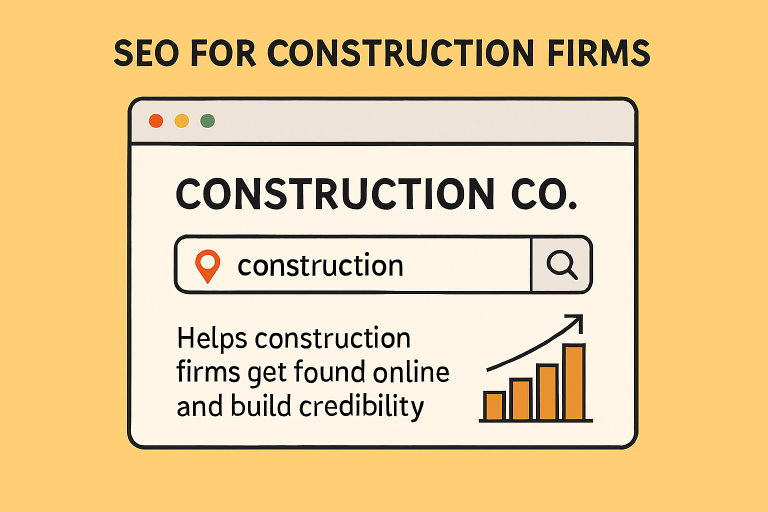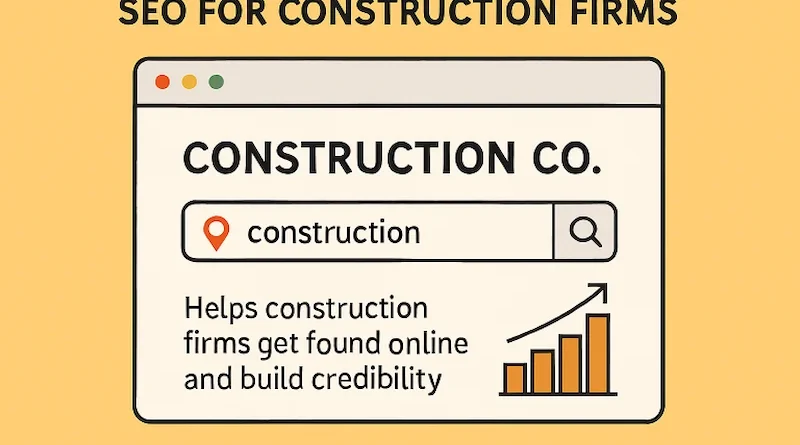Building a Strong Online Foundation: The Benefits of SEO for Construction Firms
1. Why a Digital Presence Matters for Construction Companies
The digital era has transformed how clients find and evaluate construction firms, with most turning to online channels before making contact. A strong online presence, achieved through websites, client testimonials, and resources like Rsmconnect.com, not only attracts attention but also builds credibility and trust, which are crucial for projects involving significant investment. Beyond branding, an effective digital footprint serves as a testament to professionalism and reliability. As digital transformation reshapes the industry, firms leveraging SEO and digital marketing gain a competitive edge, generating more qualified leads and improving client acquisition and retention.
2. What Is SEO and How Does It Apply to Construction Firms?
Search Engine Optimization (SEO) refers to the process of increasing the quality and quantity of website traffic by making your site more visible to users of search engines like Google. For construction companies, mastering SEO is especially valuable. It involves optimizing your web content and structure for industry-specific keywords and phrases that your prospective clients are searching for, such as “commercial builders near me” or “industrial construction services.”
Three types of SEO stand out for construction firms:
- Local SEO: Ensures your business appears in search queries relevant to your geographical area, crucial for area-specific projects.
- Technical SEO: Focuses on backend improvements like site speed, mobile-friendliness, and secure hosting, all of which impact search engine rankings.
- Content-driven SEO: Centers on the information shared on your site—project highlights, blogs, and expertise demonstrations to inform and attract prospective clients.
Many construction companies still fall short online due to outdated websites, a lack of content, or ignoring industry-specific keywords. Avoiding these pitfalls is the first step toward a successful digital strategy.

3. Key SEO Strategies for Building a Strong Online Foundation
A well-structured, easy-to-navigate website lays the groundwork for effective SEO. Clear menus, well-defined service pages, and logical navigation not only enhance user experience but also help search engines properly index your site. Both on-page SEO (optimizing page titles, headers, content, and images for relevant keywords) and off-page SEO (building authoritative backlinks and engaging in strategic partnerships) are crucial components of a comprehensive SEO strategy.
Local search optimization is particularly crucial for construction companies seeking to secure projects within specific regions. This means ensuring accurate business listings across platforms, gathering positive reviews, and featuring location-specific projects on your site to boost relevance in area-based search queries.
4. Content Creation: Showcasing Expertise and Projects
Content quality is a cornerstone of effective SEO in the construction industry. Showcasing recent projects not only highlights your technical abilities but also gives prospective clients tangible proof of your capabilities. Featuring testimonials and detailed case studies establishes trust and reassures clients about your value proposition. Blog posts covering industry trends, construction tips, or community involvement provide further evidence of your firm’s expertise and dedication.
5. Building Authority: Earning Reviews and Backlinks
Third-party reviews play a pivotal role in solidifying your company’s reputation. Encouraging pleased clients to leave feedback on trusted platforms builds a bank of positive experiences for potential leads to review. Additionally, strategically-built backlinks—connections from industry organizations, local chambers of commerce, and relevant publications—enhance your site’s authority in the eyes of search engines. Aligning with respected partners and seeking industry recognition not only increases credibility but also drives targeted, referral-based traffic to your site.
8. The ROI of SEO for Construction Businesses
Firms that invest in SEO routinely report measurable improvements: more qualified inquiries, increased bid opportunities, and a higher rate of project wins. For example, a construction company that improved its local SEO visibility can see its inbound leads multiply within months—a change that not only reduces cost-per-lead but also stabilizes long-term business growth in dynamic market conditions.
SEO creates ongoing value long after the initial setup, shielding your business from market fluctuations and maintaining a full pipeline in a competitive space.
9. Next Steps: Laying the Digital Groundwork
To strengthen your online presence, begin by auditing your current website and online listings. Address navigation and content gaps, initiate a blog or project gallery, and solicit client testimonials to enhance your online presence. Invest in the tools and resources necessary for ongoing SEO improvements, whether in-house or with the support of an agency. Remaining proactive with digital strategy ensures your firm thrives as the industry continues to evolve.
Conclusion
Investing in a robust digital presence and strategic SEO efforts offers measurable benefits for construction firms. By optimizing websites, creating engaging content, and building authority through reviews and backlinks, companies not only increase visibility but also cultivate trust with prospective clients. The long-term ROI of these initiatives—more qualified inquiries, higher project win rates, and sustainable business growth—demonstrates that digital strategy is no longer just an advantage, but a necessity. Proactively laying this digital groundwork ensures that construction firms are well-positioned to thrive, regardless of how the industry landscape continues to evolve.
Visit the rest of the site for more interesting and useful articles.

